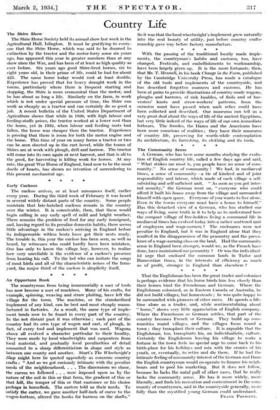An Opportune Book
The countryman from being immemorially a user of tools has now become a user of machines. Many of his crafts, for example, spinning, weaving and straw plaiting, have left the village for the town. The machine, or the standardized implement of any kind, can be best and most cheaply manu- factured in factories. As a result, the same type of imple- ment tends now to be found in every part of the country. In the not distant past it was otherwise ; each part of the country had its own type of wagon and cart, of plough, in fact, of every tool and implement that was used. Wagons above all evolved a character particular to their locality. They were made by local wheelwrights and carpenters from local material, and gradually local peculiarities of detail amounted to a sharp differentiation in shape and style as between one county and another. Sturt's The Wheetwright's Shop might here be quoted appositely as concerns country crafts ; " And so we got curiously intimate with the peculiar needs of the neighbourhood. . . . The dimensions we chose, the curves we followed . . . were imposed upon us by the nature of the soil in this or that farm, the gradient of this or that hill, the temper of this or that customer or his choice perhaps in horseflesh. The carters told us their needs. To satisfy the carter, we gave another half-inch of curve to the wagon-bottom, altered the hooks for harness on the shafts."
So it was that the local wheelwright's implement grew naturally into the real beauty of utility, just before country crafts- manship gave way before factory manufacture.




























































 Previous page
Previous page